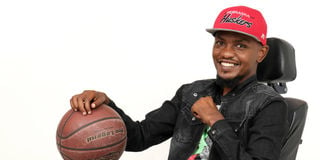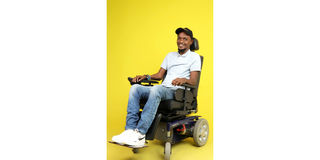Premium
Brian Muchiri: Why we must talk about adult diapers for people with disabilities

Brian Muchiri suffered a spinal cord injury and has spent eight years in a wheelchair.
Brian Muchiri has spent eight of his 28 years in a wheelchair after a spinal cord injury. That definitive moment – the road accident that got him there – is not what defines him but it certainly spurs him to fulfil his life’s mission.
“I am a writer and advocate for the disability community. I am also the founder of Strong Spine, a foundation which seeks to empower and uplift disabled people around the country.
“My mantra is ‘The way to know life is to love many things’, a quote by Vincent Van Gogh. I am always dipping my fingers in new experiences trying to widen my scope of thinking and understanding of the world.”
Lately, he has been thinking about launching a business or online marketplace where people with disabilities can sell and buy assistive devices.
“One of the biggest issues we face is accessing assistive devices and I would like to create a space where most things can be found under one roof.”
He spoke to DN Life&Style about some of the things that define him of late, and why he wants people to talk about adult diapers.
How has your attitude evolved over the last eight years? Tell us about your highs and lows.
I struggled to accept the extent of how my spinal cord injury had changed my life. I went through severe depression for the first two years and couldn’t see any good things in my life. Thankfully, I was able to overcome that part of my life and transition into a more accepting and calm state.
My highs include launching and running my foundation; successfully doing campaigns that I believe in and that impact the lives of the disability community; being able to work and earn as a writer with one of my first jobs being at the Potentash Blog where I was mentored and trained to become better at my trade.
I have evolved into a more rational and resilient person. I am no longer a victim of the things that happen to me. I choose to look at things from a bigger perspective with the understanding that it’s all part of a bigger picture and I play a very small role. I have fond memories of rediscovering myself as a disabled man, finally being comfortable in my skin and truly enjoying the life I live with no regrets.

Brian Muchiri suffered a spinal cord injury and has spent eight years in a wheelchair.
Did you undergo counselling?
I didn’t go through counselling and that probably slowed my healing process. I had to deal with all the emotions by myself but given the chance to do it again, I would opt to talk to a professional to help me make sense of and understand the things I was feeling and why I felt them.
You write very well. Is it a therapeutic process for you?
There is a clear difference in my demeanour during the days when I am writing and the days when I am experiencing writer’s block. It’s also more than therapy because it gives me a sense of achievement to create something that I like and other people appreciate as well. Thank you for the compliment.
Talk to me about the foundation you started. How old is it, and what triggered it?
I started it in late 2018 because I wanted to do for other people what my family and friends had successfully and continuously done for me.
The real story behind Strong Spine is the fact that my friends came together and raised money for me to get a power wheelchair which quite literally changed my life and gave me the freedom and independence I had thought to be impossible after the accident. I understood that not everyone is this lucky to have people able or willing to go to those lengths to help them out so that became my way of giving back.
One of my most passionate projects in Strong Spine is the adult diaper conversation. Despite adult diapers being a basic need for most people with disabilities, this topic has been taboo and I have been intentional about changing that narrative because diapers are expensive and inaccessible to most people. We should talk more about it.
What are some of the weirdest comments or questions you have received or heard about the usage of adult diapers? And how do you address the stigma and taboo?
The general stereotype is that using adult diapers makes you weak, unclean, and undesirable. These are the mentalities we grew up with and I understand that it might take us some time to unlearn them.
I look at them as a source of convenience and freedom. As I said, it’s a basic need for our community and the trouble is when society tries to treat us as less because we have conditions that make us incontinent. That’s a very shallow way to look at things and I keep the conversation alive because I know of people who are suffering silently; they are too ashamed to come out and say they are struggling to access diapers.
What does the ideal future look like for you, for people with disabilities who need diapers?
I see a future where it’s no longer a struggle for disabled people to access assistive devices of all kinds. I see diapers being made from recycled material to reduce cost and ultimately being sold for under Sh500 a packet. That would be a dream for our community, and I am positive that it can be achieved. Once we address prices and accessibility, we will have closed the gap that already exists and also promote a better quality of life.
My vision for Strong Spine is that it will grow to be an institution where people with disabilities feel uplifted and empowered. I hope that I can play a role in planting a seed of possibility in their lives and letting them know that though the road is rocky, the journey will still be worth it. I am a proud member of the community and I am ready and willing to usher in a new wave of how we perceive disability in our society.
Your parting shot?
My last words will echo the words I live by: “The way to know life is to love many things”. For you to live, you must be alive first.
***
Do you have feedback on this article? Please e-mail: [email protected]



